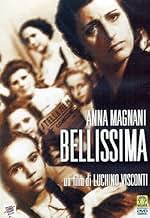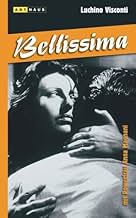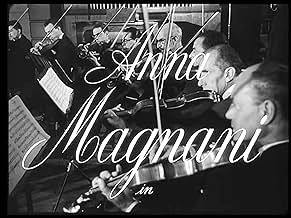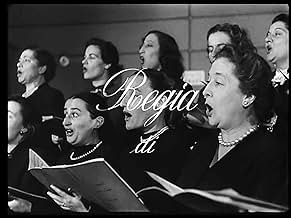Bellissima
- 1951
- Tous publics
- 1h 54min
NOTE IMDb
7,7/10
5,8 k
MA NOTE
Une femme de la classe populaire tente désespérément de faire entrer sa fille dans le monde du cinéma.Une femme de la classe populaire tente désespérément de faire entrer sa fille dans le monde du cinéma.Une femme de la classe populaire tente désespérément de faire entrer sa fille dans le monde du cinéma.
- Réalisation
- Scénario
- Casting principal
- Récompenses
- 1 victoire et 1 nomination au total
Liliana Mancini
- Iris
- (as Iris)
Vittorio Musy Glori
- Self
- (as Vittorio Glori)
Avis à la une
A wonderful, poignant masterpiece by the great Visconti and Anna-the-Great-Magnani. On the surface, it is a simple story about a mother's obsession to use her little daughter's appearance to escape the poverty of post-war Italy. What transpires is the cruel truth about the beauty- and illusion-making industry (cinema), with all its inherent cynicism, at a time when hunger for the daily bread was equaled by hunger for fantasy and beauty.
I've seen this movie only once, ages ago, and it still remains with me as one of the most unforgettable films I have ever seen. In a world that has seen hundreds of thousands of films that is no small feat.
I've seen this movie only once, ages ago, and it still remains with me as one of the most unforgettable films I have ever seen. In a world that has seen hundreds of thousands of films that is no small feat.
In a post-war Italy, Maddalena Cecconi (Anna Magnani) is a woman from the lower classes abused by her husband Spartaco Cecconi (Gastone Renzelli), who is obsessed to make her young daughter Maria (Tina Apicella) a star in the cinema industry. She expects a better life for Maria, and she sacrifices her marriage and her savings paying interpretation and ballet teachers, dress, hairdresser and bribe for the small time crook Alberto Annovazzi (Walter Chiari) to make her dream come true. When the director sees the test of Maria, Maddalena realizes the reality and cruelty of the entertainment industry.
"Belissima" is a beautiful tale of disillusion. Anna Magnani has a magnificent interpretation in a role of a very poor mother and frustrated woman, spanked by her husband, trying to give a better life for her young daughter. Living nearby a movie theater, she sees the opportunity when a famous director is chasing a young talent for his next movie. Her characters gives the best effort within her short culture and vision trying to make her dream comes true, being very touching the moment when her dreams are shattered. The direction of Luchino Visconti is precise and flawless as usual, and the story is very real and credible. My vote is eight.
Title (Brazil): "Belíssima" ("Very Beautiful")
"Belissima" is a beautiful tale of disillusion. Anna Magnani has a magnificent interpretation in a role of a very poor mother and frustrated woman, spanked by her husband, trying to give a better life for her young daughter. Living nearby a movie theater, she sees the opportunity when a famous director is chasing a young talent for his next movie. Her characters gives the best effort within her short culture and vision trying to make her dream comes true, being very touching the moment when her dreams are shattered. The direction of Luchino Visconti is precise and flawless as usual, and the story is very real and credible. My vote is eight.
Title (Brazil): "Belíssima" ("Very Beautiful")
It was as if I had taken a time machine back to 1951. Sitting at the open theater of Tiberina Island in Rome, Anna Magnani's voice bounced off the ancient angles of this stunning roman spot. "Bellissima" is a timeless masterpiece. A rarity in Visconti's oeuvre. He puts all of his uncanny attention to detail to the service of Magnani's bombastic, tender, funny, extraordinary performance. Visconti knew how to bring the best in his actors. Even Maria Callas who, under Visconti's guidance, went from the greatest Opera singer to the greatest actress singing Opera. There are moments in "Bellissima" that can only be described as a love letter from Visconti to Magnani and vice versa. She has a few close ups that tells us how much love, respect and admiration existed between this two enormous artists. Look at her moments in the mirror, combing her hair naturally, debating under her breath the proper pronunciation of a word. She, not a conventional beauty, looks ravishing. The message about the dangers of immediate fame and fortune could have been written today. If you have a chance, don't miss it. If you love film, it's a must!
This is a very small story--a poor woman tries to make her daughter a child movie star--but it has a tremendous, operatic performance from Anna Magnani. Magnani is like all other stage mothers in that the success she desires for the child is really her frustrated ambition for herself (her tiny daughter has no interest in acting, and whines and cries all through the picture), but unlike them in that she never loses her sense of humour. When she realises she has been cheated, instead of becoming outraged, she laughs at her own foolishness, briefly relaxing from her usual blind intensity to become a normal, likable woman.
Her character's desperation to escape her life is understandable when one sees the dump she lives in with her husband and child. The small, dilapidated flat with stained walls, in a building full of fat, sour- faced harpies in hideous housedresses--one never sees such horrors in Hollywood films. Too bad this neo-realism became old-style realism--we could use some of this today as a counter to the candy-floss world we see on TV and in the movies.
One amusing note: The film-struck Magnani says at one point to her husband, "Oh, Burt LanCASter! Molto gentile!" Three years later Lancaster would be playing her lover in The Rose Tattoo.
Her character's desperation to escape her life is understandable when one sees the dump she lives in with her husband and child. The small, dilapidated flat with stained walls, in a building full of fat, sour- faced harpies in hideous housedresses--one never sees such horrors in Hollywood films. Too bad this neo-realism became old-style realism--we could use some of this today as a counter to the candy-floss world we see on TV and in the movies.
One amusing note: The film-struck Magnani says at one point to her husband, "Oh, Burt LanCASter! Molto gentile!" Three years later Lancaster would be playing her lover in The Rose Tattoo.
Anna Magnani is magnificent as a pushy show-biz mother determined to get her daughter into the movies. She's like an early prototype of Bette Midler but she's more down-to-earth and with a greater propensity for feeling. (Midler could do the comedy but not the pathos). The film is charming but for a Visconti movie, it's slight. It's a great director's trifle about the movies; he enjoys poking fun at the stereotypes he's worked with in more serious films. It's laugh out loud funny.
The film doesn't offer any insights into the movie-making process and even the wheeling and dealing seems perfunctory. At times you wish maybe Visconti had gone a little deeper. (At the end he makes a point that the movies can be shallow but we know that already). Take Magnani out of the equation and there really isn't much left. She's the life-force that holds it together. It really is a great piece of acting.
The film doesn't offer any insights into the movie-making process and even the wheeling and dealing seems perfunctory. At times you wish maybe Visconti had gone a little deeper. (At the end he makes a point that the movies can be shallow but we know that already). Take Magnani out of the equation and there really isn't much left. She's the life-force that holds it together. It really is a great piece of acting.
Le saviez-vous
- AnecdotesIn the final scene, Anna Magnani hears the film playing outside her room and remarks that she hears Burt Lancaster. Magnani would win an Oscar four years later for The Rose Tattoo, in which she would costar with Lancaster.
- ConnexionsEdited into Al Centro del cinema (2015)
Meilleurs choix
Connectez-vous pour évaluer et suivre la liste de favoris afin de recevoir des recommandations personnalisées
- How long is Bellissima?Alimenté par Alexa
Détails
- Date de sortie
- Pays d’origine
- Langue
- Aussi connu sous le nom de
- Beautiful
- Lieux de tournage
- Ristorante Al Biondo Tevere, Via Ostiense, 178, Roma RM, Italie(Trattoria by the River Tiber)
- Société de production
- Voir plus de crédits d'entreprise sur IMDbPro
- Durée1 heure 54 minutes
- Couleur
- Rapport de forme
- 1.37 : 1
Contribuer à cette page
Suggérer une modification ou ajouter du contenu manquant

Lacune principale
By what name was Bellissima (1951) officially released in Canada in English?
Répondre



























